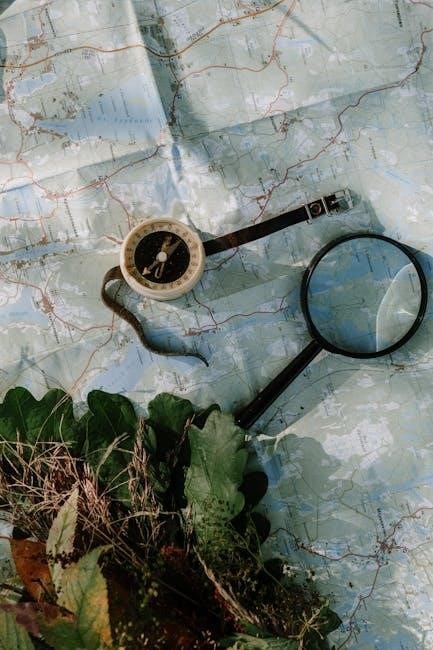Crossword puzzles are popular word-based games that challenge the mind. They involve filling a grid with words, solving clues, and improving vocabulary. Solving crosswords enhances cognitive skills and provides entertainment for all ages. They are widely enjoyed in newspapers, magazines, and online platforms, making them a timeless favorite for mental stimulation and fun.
1.1 What Are Crossword Puzzles?
Crossword puzzles are word-based games where players fill a grid with words, solving clues provided for each entry. The grid consists of squares, some filled with numbers and clues, while others are blank. Clues are categorized as “Across” (horizontal) or “Down” (vertical), guiding solvers to the correct answers. Crosswords are popular in newspapers, magazines, and online platforms, offering mental stimulation and a sense of achievement. They are widely enjoyed for their educational value and entertainment, making them a beloved activity worldwide.
1.2 Benefits of Solving Crossword Puzzles
Solving crossword puzzles offers numerous cognitive and emotional benefits. It enhances vocabulary, improves memory retention, and boosts problem-solving skills. Regularly engaging with crosswords can delay cognitive decline, as it challenges the brain and promotes mental agility. Additionally, crosswords provide a sense of accomplishment and relaxation, making them a fun and rewarding activity for people of all ages. They also foster patience and persistence, essential traits for personal growth and development.
1.3 Why People Love Crosswords
People love crosswords for their unique blend of challenge and relaxation. They enjoy the mental stimulation, the thrill of solving tricky clues, and the satisfaction of completing a puzzle. Crosswords provide an escape from daily stress, offering a fun and intellectual distraction. They also allow for personal growth, as learners expand their vocabulary and improve critical thinking. The sense of accomplishment and the joy of discovery make crosswords a beloved pastime for millions worldwide, appealing to both casual solvers and dedicated enthusiasts alike.

Understanding Crossword Basics
Crossword puzzles feature a grid with black and white squares. Clues provide hints for answers, which are words filling the white spaces. Understanding grids, clues, and terminology is essential for solving crosswords effectively.
2.1 How Crossword Grids Work
Crossword grids consist of a square or rectangular pattern with black and white squares. White squares are for filling in letters, while black squares separate words. Typically, grids are symmetrical and have a balanced number of black squares. Words can be placed horizontally (across) or vertically (down), and each word must intersect with at least one other word. The grid’s design ensures that clues can be numbered and organized logically, making it easier for solvers to navigate and complete the puzzle systematically.
2.2 Clues and Their Structure
Crossword clues are statements that guide solvers to the correct answers. They are usually categorized as “Across” (horizontal) or “Down” (vertical) and include a clue number. Clues often use wordplay, puns, or straightforward definitions. For example, “Flower that’s also a girl’s name” might lead to “Lily.” Some clues include hints like question marks to indicate puns or asterisks for anagrams. The structure ensures clarity, with the part of speech matching the answer, making them both challenging and solvable with logical thinking and vocabulary knowledge.
2.3 Common Crossword Terminology
Understanding crossword terminology enhances solving experience. Terms include “Across” (horizontal answers) and “Down” (vertical answers). “Clue number” refers to the clue’s position. “Black square” divides words, while “White square” is part of the answer grid. “Anagram” clues rearrange letters, and “Crosswordese” are words frequently used in puzzles. “Theme answers” relate to the puzzle’s central idea, and “Filler words” complete the grid. Knowing these concepts aids in mastering crossword techniques and improving problem-solving skills effectively and efficiently.

Tips for Solving Crosswords
Mastering crosswords requires strategy and practice. Start with easy clues to build momentum, use wordplay, and leverage solvers wisely. Pay attention to grammar and tense, as they often match between clues and answers. Regular practice enhances vocabulary and pattern recognition, making solving more enjoyable and efficient over time.
3.1 Start with Easy Clues
Beginning with easy clues is a proven strategy for crossword success. Simple clues, often fill-in-the-blank or common phrases, provide quick answers and build confidence. This approach fills the grid gradually, revealing word intersections that unlock harder clues. Prioritizing straightforward questions ensures steady progress, making the puzzle less intimidating. By focusing on what you know, you create a foundation for tackling more complex challenges, keeping the solving process enjoyable and productive.
3.2 Use Wordplay and Patterns
Mastering wordplay and recognizing patterns are key to solving crosswords efficiently. Common techniques include anagrams, puns, and double definitions. Pay attention to clues with question marks, indicating wordplay. Patterns like repeated letters or common prefixes/suffixes can also guide you. For example, homophones or hidden words within clues often lead to answers. Practice helps in identifying these tricks, making you a faster and more confident solver. Embrace these strategies to decode clues and enhance your crossword-solving experience.
3.3 Leverage Crossword Solvers Wisely
While crossword solvers can be incredibly helpful, use them strategically to avoid undermining your learning process. Choose reputable tools with updated databases for accuracy. Reserve solvers for when you’re truly stuck, as over-reliance can hinder skill development. They are excellent for verifying answers or understanding tricky clues but shouldn’t replace the satisfaction of solving puzzles independently. By using solvers wisely, you can enhance your journey without losing the joy of discovery and growth in your crossword-solving abilities.
3.4 Pay Attention to Grammar and Tense
Grammar and tense are crucial in crossword puzzles, as clues and answers must align. Ensure the part of speech and tense match between the clue and answer. For example, a plural clue requires a plural answer, and a past tense clue demands a past tense solution. Paying attention to articles, prepositions, and word forms can help narrow down possibilities. This focus reduces guesswork and enhances solving efficiency, making it a key skill for mastering crosswords effectively and confidently.

Advanced Crossword Techniques
Advanced crossword techniques involve mastering crosswordese, solving cryptic clues, and handling tricky wordplay. These skills challenge experienced solvers and enhance puzzle-solving expertise significantly.
4.1 Mastering Crosswordese
Mastering crosswordese involves recognizing common words that frequently appear in puzzles. These words often have unusual meanings or are rarely used in everyday language. Examples include “Erie” for a lake or “Aegean” for a sea. Solvers should memorize these terms to improve their efficiency. Regular practice and exposure to crosswords help build familiarity with crosswordese, making it easier to tackle challenging puzzles. Over time, these words become second nature, enhancing overall solving speed and accuracy.
4.2 Solving Cryptic Crosswords
Cryptic crosswords require interpreting clues with wordplay, often involving double definitions or anagrams. Solvers must identify the definition and the wordplay within each clue. For example, “Flower that’s also a girl’s name” could hint at “Lily.” Practice recognizing these patterns, as they are key to success. Resources like solvers’ blogs and dictionaries can aid in understanding tricky clues. Patience and a keen eye for wordplay are essential for mastering cryptic crosswords, making them a rewarding challenge for experienced solvers.
4.3 Handling Tricky Clues
Tricky clues often challenge solvers with wordplay or indirect meanings. To tackle them, look for patterns like anagrams, double definitions, or hidden phrases. Break down the clue into parts, identifying the definition and the wordplay. Pay attention to grammar and tense, as they often match the answer. Use dictionaries or crossword solvers for unclear words. Persistence and practice help improve skill in decoding these clues, making even the toughest puzzles solvable with time and effort.

Tools and Resources
Crossword enthusiasts can utilize various tools like reputable solver websites, dictionaries, and online forums. These resources help solve puzzles, expand vocabulary, and connect with fellow solvers worldwide.
5.1 Best Crossword Solver Websites
Reputable crossword solver websites like Crosswords.io, NYTimes, and Crossword Solver offer reliable solutions. These platforms provide accurate answers, word definitions, and anagram tools. They are frequently updated and trusted by enthusiasts. Using such sites as a last resort helps maintain the puzzle’s challenge while ensuring progress. They are indispensable for solvers seeking assistance or verification, making them valuable resources in the crossword community.
5.2 Dictionaries for Crossword Enthusiasts
Dictionaries are indispensable tools for crossword enthusiasts, providing quick access to word definitions and spellings. Reputable options like Merriam-Webster and Oxford Dictionaries offer comprehensive word lists and examples. Crossword-specific dictionaries, such as crosswordese-focused editions, cater to solvers by highlighting frequently used puzzle words. These resources help expand vocabulary, clarify meanings, and enhance solving accuracy, making them essential for both beginners and seasoned crossword lovers aiming to improve their skills and enjoyment of the game.
5.3 Crossword Communities and Forums
Crossword communities and forums connect enthusiasts worldwide, fostering collaboration and learning. Platforms like Reddit’s r/CrosswordPuzzles or specialized crossword forums offer spaces to discuss puzzles, share tips, and learn from experts; These communities provide resources, feedback, and shared knowledge, helping solvers improve their skills. Many forums feature discussions on tricky clues, emerging trends, and strategies, making them invaluable for both novices and experienced crossword lovers seeking to enhance their problem-solving abilities and enjoyment of the game.
Practice and Improvement
Regular practice is key to improving crossword skills. Start with daily mini puzzles, track progress, and learn from mistakes. Consistency builds confidence and enhances problem-solving abilities over time.
6.1 Start with Daily Mini Crosswords
Daily mini crosswords are an excellent starting point for beginners. These compact puzzles are quick to solve, often taking less than five minutes. By tackling a mini crossword each day, you can gradually build your vocabulary and confidence. They introduce essential crossword mechanics, such as grid navigation and clue interpretation, without overwhelming. Consistency with mini crosswords lays a strong foundation for tackling larger, more complex puzzles in the future.
6.2 Learn from Experts
Learning from experienced crossword solvers can significantly enhance your skills. Following expert solvers, such as A.J. Jacobs, and studying their strategies provides valuable insights. Many experts share tips through blogs, videos, and workshops, offering practical advice on tackling clues and improving technique. Engaging with crossword communities and forums also allows you to gain knowledge from seasoned players. By learning from experts, you can adopt proven methods, avoid common pitfalls, and accelerate your progress in becoming a skilled crossword solver.
6.3 Track Your Progress
Tracking your progress is essential for improving crossword-solving skills. Start by solving puzzles regularly and noting your completion times. Use a journal to record clues you find challenging and review them later. Many online platforms offer progress-tracking features, showing your improvement over time. Celebrate milestones, like mastering shorter answers or tackling harder clues. This approach helps you identify weaknesses, build confidence, and stay motivated to continue enhancing your crossword abilities.

The Fun Side of Crosswords
Crossword puzzles offer endless entertainment, combining mental challenge with creative enjoyment. They feature themed puzzles, clever wordplay, and interactive competitions, making them a delightful activity for all ages. Tournaments and themed crosswords add excitement, while sharing solutions with friends enhances the fun. Crosswords are a rewarding way to relax, learn, and connect with others who share the passion for word games.
7.1 Crossword Tournaments
Crossword tournaments add a competitive edge to puzzle solving, bringing enthusiasts together for thrilling challenges. Events like the American Crossword Puzzle Tournament showcase expert solvers, with champions like Dan Feyer dominating for years. These competitions test speed, accuracy, and knowledge under pressure. Participants enjoy camaraderie, shared passion, and the joy of mastering tough clues. Tournaments also feature themed puzzles, adding an extra layer of fun and creativity. They’re a great way to connect with fellow crossword lovers and celebrate the joy of solving.
7.2 Creative Crossword Themes
Creative crossword themes add an extra layer of fun and challenge. Many puzzles feature unique themes, such as movies, music, or historical events, making them more engaging. Constructors craft clever clues and wordplay to tie the theme together. For example, a music-themed crossword might include song titles or artist names. These themes cater to diverse interests, enhancing the solving experience. They also encourage learning and exploration of new topics, turning crosswords into a celebration of knowledge and creativity.
7.3 Sharing Solutions with Friends
Sharing crossword solutions with friends enhances the fun and social aspect of solving puzzles. Discussing clues and answers fosters collaboration and friendly competition. Many solvers enjoy comparing progress, learning from each other, and celebrating successes. Online platforms and apps make it easy to share solutions and track improvements. Explaining answers to others can also reinforce your own understanding. This shared experience turns crosswords into a communal activity, spreading joy and the satisfaction of solving together.
Crossword puzzles offer endless joy and mental stimulation. Solving them sharpens your mind and fosters a sense of accomplishment. Keep exploring, learning, and enjoying the world of crosswords!
8.1 The Joy of Crossword Solving
Solving crosswords brings immense satisfaction and intellectual delight. The thrill of uncovering hidden words and connecting meanings creates a sense of achievement. It’s a meditative activity that sharpens your mind while offering relaxation. Discovering new words and overcoming challenges enhances your vocabulary and problem-solving skills. Sharing solutions with friends or communities adds a social dimension, making it a rewarding hobby. The joy lies in the journey of learning and the pleasure of mastering a puzzle.
8.2 Encouragement to Keep Solving
Embrace the challenge and enjoy the journey of crossword solving. Every puzzle completed is a step forward, sharpening your mind and boosting confidence. Celebrate small victories, as each solved clue brings you closer to mastery. Even when stuck, persistence pays off, fostering problem-solving skills and patience. The more you solve, the more you’ll discover the joy of learning new words and unraveling clever clues. Keep solving—your brain and creativity will thank you for the lifelong adventure!